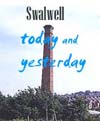
 |
SwalwellMemories 2 |
| Radio and TV | Childhood Pastimes | Dialect |
|
Home Origins Industry Railways Buildings Buildings 2 People Sport Memories Memories 2 Memories 3 Memories 4 Today Links |
Memories 2This is another page devoted to some memories of Swalwell in the post war period up to the 1960s. There is a section on radio and TV broadcasts of the period and the rest is mostly childhood memories.
RADIO AND TELEVISION IN THE POST WAR YEARS

Find a biography of a radio or television personality from the 1950's or later listed alphabetically by surname.A | B | C | D | E | F | G | H | I | J | K | L | M | N | O | P | Q | R | S | T | U | V | W | X | Y | Z |RadioLike people everywhere else, Swalwellers listened to the radio and watched TV. Until the BBC began broadcasting from its new Pontop Pike transmitter in time for the Coronation in 1953, radio was the only form of broadcast news and entertainment available locally.* Radio broadcasting began from Newcastle with the BBC in 1922, using a new transmitter at Stagshaw Bank from 1937, and after the Second World War there were three programmes, the Home Service, the Light Programme (which began in July 1945) and the Third Programme. The Home Service was the main source of news, factual programmes, talks, plays, sport and the arts and other fairly serious content, while the Light was, as its name suggests, the source of light entertainment - comedy, light and popular music, record-requests and similar output. The Third was devoted to classical music, plays, talks and other so-called 'highbrow' features.* Before Pontop Pike opened it was just possible to receive TV transmissions from the BBC's Holme Moss transmitter, serving the Manchester area, but reception was poor. We had the North Home Service on Tyneside which actually meant Manchester with a few programmes broadcast from the BBC's Newcastle studios in New Bridge Street. Unfortunately the North East had lost its own frequency in 1945, from which time it shared with Belfast. This meant a stream of Irish sports, music and news broadcasts and a regular Irish comedy show about a Belfast family written by actor Joseph Tomelty and called The McCooeys broadcast on Saturday evenings. Despite protests we endured this situation for many years although we did have our own popular show in 'Wot Cheor Geordie', introduced by Esther McCracken and featuring local comedians Bobby Thompson and Dick Irwin among others. This unhappy arrangement (sharing a frequency with Northern Ireland who of course also had to listen to programmes about the North East, Cumberland and Westmorland) continued until 1963 although by then we had got our own frequency on VHF (FM) when VHF transmissions began in the 'fifties. By this time the Third Programme had become Network Three and soon afterwards the pirate radio stations appeared which were to change popular broadcasting and lead to the introduction of the BBC's Radio One. Commercial radio began in the north east in 1974 when Metro Radio started broadcasting from its studios here in Swalwell (it has now moved to Newcastle) and other stations followed. Meanwhile, the BBC had introduced Radio Newcastle back in 1971 and virtually their whole broadcasting operation moved to new premises in Barrack Road, Newcastle in 1987. Radio Luxembourg and the American Forces Network were also heard in Britain. Luxembourg on the 208 medium wavelength, featured Hughie Green's Double Your Money, and Basil Rathbone and Nigel Bruce as Sherlock Holmes and Doctor Watson. An often-heard commercial was for the Horace Bachelor Infradraw method of picking the winners for the football pools, with the voice which told us to send our name and address to Keynsham, with K E Y N S H A M being spelled out, irritatingly, when you had heard it a few times! This station broadcast a lot of DJ shows with the new rock and roll music of the fifties. American Forces Radio broadcast a lot of pop music too, but of course with a lot of US news, baseball commentaries and the like. Although the BBC was a national broadcaster there was little mention of provincial towns and cities or rural areas outside the home counties unless it was in connection with an important news event. As far as the north-east was concerned it was rare to hear it mentioned. Exceptions were programmes which were broadcast from a different place each week, like Have A Go!, Down Your Way or Worker's Playtime. Back to top of page |
Radio TimesSome early post-war Radio Times covers are shown. The first three depict: Durham cathedral; Dick Barton, left, (played by Noel Johnson); and the second Mauretania.The second group shows: P.C. 49 (played by Brian Reece with Joy Shelton); the Take It From Here stars), Jimmy Edwards, Joy Nichols and Dick Bentley); and bottom, Wilfred Pickles; and the Cup Final, Arsenal v. Newcastle United with captains Joe Mercer and Joe Harvey. The third group are: Dick Irwin in Wot Cheor, Geordie!, (broadcast from Newcastle); United Nations Day, October 24th; and actress Yvonne Arnaud. The final group are: A Christmas Eve programme, Amahl and the Night Visitors; Holiday Hour, which was a trip from Berwick to Land's End by bus in ten episodes; and the Cup Final, Manchester city v. Newcastle United with captains Roy Paul and Jimmy Scoular. 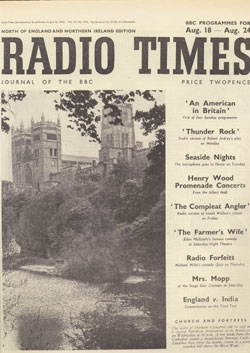
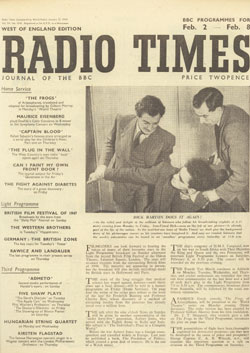
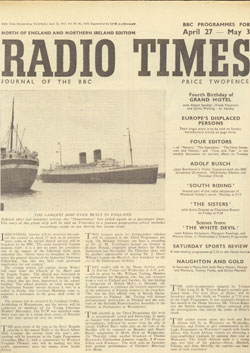 |
| Durham Cathedral. | Noel Johnson (left) as Dick Barton. | The second Mauretania. |
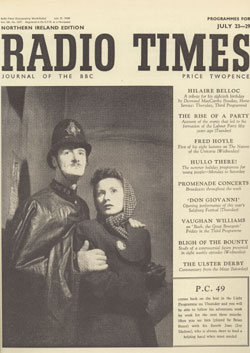
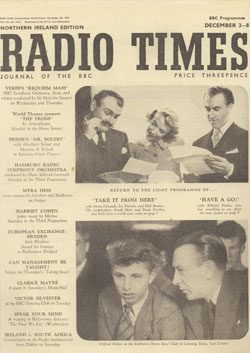
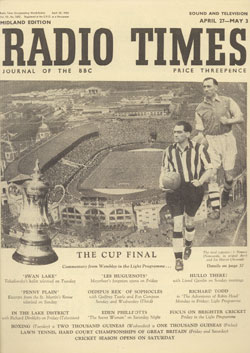 |
| Brian Reece as P.C. 49, with Joy Shelton. | Take It From Here stars, Jimmy Edwards, Joy Nichols and Dick Bentley, and bottom, Wilfred Pickles. | The Cup Final, Arsenal v. Newcastle United with captains Joe Mercer and Joe Harvey (front). |
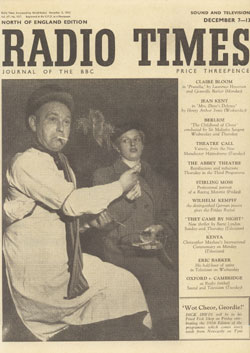 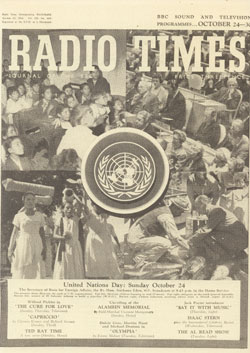
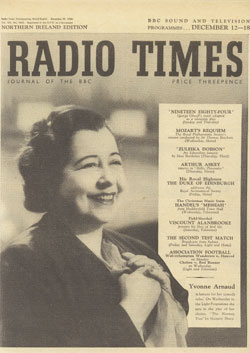
|
| Wot Cheor Geordie. | United Nations Day. | Actress Yvonne Arnaud. |
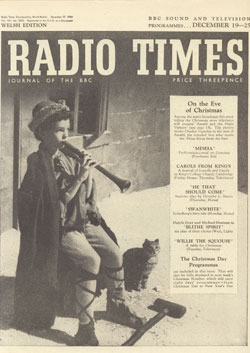
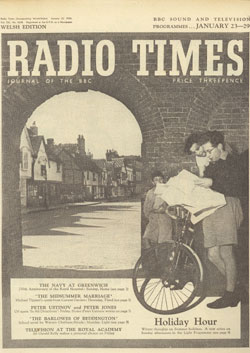
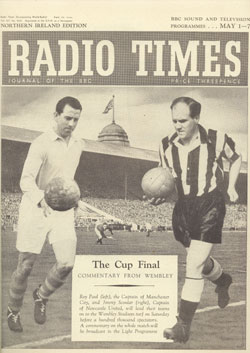
|
|
Amahl And The Night Visitors, broadcast on Christmas Eve. Back to top of page | Holiday Hour, a trip from Berwick to Land's End by bus in ten episodes. | The Cup Final, Manchester City v. Newcastle United with captains Roy Paul and Jimmy Scoular. |
ProgrammesRadio programmes from the late 'forties and 'fifties included Ray's A Laugh, Educating Archie, Take It From Here, Much Binding In The Marsh, Dick Barton, Life With The Lyons, The Goon Show, Housewives Choice, Music While you Work, Have A Go, Down Your Way, Workers' Playtime, Top of the Form, Saturday Night Theatre, Paul Temple, PC 49, Journey Into Space and those stalwart soaps (though we didn't call them soaps then), Mrs Dale's Diary and The Archers. On a Sunday dinner time it was time for Two Way Family Favourites or the Billy Cotton Band Show, while at five o' clock on a Saturday teatime the familiar strains of the music 'Out of the Blue' heralded Sports Report which for many meant the football results and checking their football coupon to see whether the fabled £75,000 was theirs at last. The North East was not forgotten. On Wednesday 27 October 1954 a serial called The Lost Silver Of Langdon, a play about Teesdale and the High Fells by Winifred Finlay, a Newcastle children's author, was broadcast. While on Sunday 12 December 1954 a programme in the series Famous Northerners featured a dramatised version of the life of the engraver Thomas Bewick. |
Televison
BBC Television started the day in its early years with an early afternoon
programme for young children and then went off the air until around
5 PM when children's television began, after which it again closed
down until 8 PM when the evenings' programmes began. Sometimes sport
(the Test Match) was screened live in the afternoons. When Tyne Tees
Television appeared early in 1959, actually on Thursday 15 January, broadcasting on Channel 8 the BBC had a rival. Tyne Tees introduced
more popular programming including several shows from the USA, though
the BBC had some American programmes too. These early commercial TV shows included: The
Adventures Of Robin Hood, No Hiding Place, Sir Lancelot, Sunday Night
At The London Palladium, Take Your Pick, Armchair Theatre, Thank your
Lucky Stars, Emergency - Ward 10, The Avengers and Danger Man. From
America we got Highway Patrol, Cheyenne, Wagon Train, Rawhide, Maverick,
Have Gun - Will Travel, Hawaiian Eye and 77 Sunset Strip. It seemed that Tyne Tees presented mostly 'popular' programming with little art, current affairs or other programmes with a more serious content.
|
TV Programme Developments BBC television shows of the 'fifties were The Lone Ranger, The Range
Rider and The Cisco Kid from the USA, All Your Own (a magazine
programme featuring children with a particular talent or hobby,
introduced by Huw Wheldon) and Armand and Michaela Denis's wildlife
programmes, all for children. The Appleyards was a children's
serial, the title referring to a family of that name. Blue Peter
and Crackerjack came later. |
|
POSTSCRIPTIn the 21st century local broadcasting still exists, with the BBC's local radio stations including Radio Newcastle and commercial radio broadcasting locally. Local television, however, has suffered a major decline. The BBC has a limited output of programmes with a local content, but Tyne Tees Television, particularly since its move from City Road studios on 2 July 2005, is a mere shadow of its former self with a small news and weather studio and no big studio or facilities for producing its own shows like The Tube or The One O'Clock Show. There is no filmed drama either, such as the series of Catherine Cookson adaptations of recent memory. Concern has been expressed in the press about this (2009). Continuity announcers are largely a thing of the past too. Tyne Tees is now located in the Watermark business park west of Gateshead on the banks of the Tyne near the Metro Centre. The ITV regional companies, including Tyne Tees, which once had such strong local identities, have been largely incorporated into a national ITV brand. Local television news on both channels has also broadened its geographical coverage to embrace North Yorkshire, and from 2009 the old Border TV areas of Cumbria and parts of South West Scotland, while the BBC has always covered Cumbria as well as the north east, and now North Yorkshire too. Coverage moves ever southwards, Scarborough and Hawes are the most distant noted. The phrase 'our region is used on both channels to describe this vast area when our region ought to comprise only Northumberland and Durham plus Middlesbrough. This has lessened the impact of local news or at least the viewer's identification of local TV with the north east. Northumberland and Durham nevertheless comprise England's most distinctive region and are, I think, badly served by both TV and radio. Mike Neville, stalwart one-time anchorman of both BBC and Tyne Tees, has retired, and while the BBC have stuck to one main presenter for its evening news programme Look North (with Carol Malia or one of the other presenters, and there are now a variety of presenters). Tyne Tees now have co-presenters, a kind of double act which tends to give a light-hearted feel to the news. Tyne Tees had an excellent weatherman in Bob Johnson*, now retired from that positon, and his appearances with Mike Neville were a highlight of the news for many, as were George House's (on BBC Look North) at one time. The BBC has another Scot as weatherman in Paul Mooney with the personable Trai Anfield (also Scottish) and Hannah Bayman also appearing less frequently ( both have now left). For a while following the departure of Bob Johnson the Tyne Tees weather forecast came from a studio in Leeds, and then Philippa Thomson did the weather, but other presenters have followed, though it still quite often comes from Leeds. While the news content of both channels often features local accents in its reports, the obvious mimicking of Southern English pronunciation by those presenters who belong locally contrasts with the Scots who retain their own accents, and this, together with the often southern pronunciation of local place names, is another negative aspect of local broadcasting. |
Radio and Television and records - more memoriesRadio and TV manufacturers were many in the immediate post war years.Your could choose your radio or TV from a variety of makes, do you remember .....Defiant; D.E.R. (a rental company); Bush; Cossor; Ekco; Ferguson; Ferranti; GEC; HMV; McMichael; Murphy, Philips; Pye; Regentone and Ultra. In the 1950s portable valve radios became popular, powered not by the slimline batteries of today but by a single large heavy battery from Ever Ready or Vidor. It was not until the 1960s that the transistor set was introduced and they got smaller and smaller. Radiograms were another alternative, combining a radio and a gramophone in a large wooden console. Some of the gramophones had an autochange to change the records automatically and by the 1950s were beginning to be called record players as 78 rpm records gave way to the 45 and 33 rpm discs and the long-playing record or LP took off. The Top Twenty began to dominate record programmes on radio and the rock and roll era had begun. Who remembers seeing Glenn Ford in The Blackboard Jungle which featured Bill Haley and his Comets playing Rock Around The Clock around 1955? |
CHILDHOOD PASTIMES
 At the top of Napier Road about 50 years ago was a piece of waste ground
known as the marble square, marbles being a popular pastime among
schoolboys at the time. Marbles were also played before and after
school on a narrow strip of earth in front of the school wall in Crowley
Road. You could have glass marbles, the best, including glass alleys;
iron ponkers, like large ball bearings; or small clay ones, much despised.
Games of marbles had names like 'hitty once',' bets' and 'killer'.
In the first of these players took it in turn to try and hit their
opponents marble and so win it. Bets was a game in which you 'bet'
your opponent a certain number of marbles that he could not throw
an even number of marbles into a small hole scooped out of the earth,
holding the marbles in the palm of his hand. He had to cover the bet
with an equal number of marbles to those bet and if an odd number
went into the hole he lost. The game killer was much more interesting
and had quite elaborate rules. There were three small holes made in
the ground in a straight line, each about 2 feet apart, and two or
more players would take alternate turns at flicking their marbles
at the holes with their thumbs, going from one hole to the next in
a predetermined sequence governed by fairly elaborate rules compared
to the other games. A hole could be poisoned and if your opponents
marble then went into that hole it was lost. There were expressions
like 'tibby to carry', which meant an extra shot to be taken when
you chose, and was awarded when you hit two marbles with yours on
the same shot. 'Everys (or Ivvories)' and 'nowts' were other expressions but precisely
what these terms meant I cannot recall. But I think crying 'everys' meant that you could take your shot freely with no restrictions, while if an opponent shouted 'nowts' it meant that restrictions were imposed on your shot. Buttony was not surprisingly a game played with buttons, and was briefly popular but was
not something played every summer like marbles. There was also a game
played with small stones, called 'chucks' in which the object was
to catch the stones on the back of your hand, and another one played
with ice lolly sticks where you had a pile of sticks which had been
thrown up in the air and you had to remove all the sticks one by one
without disturbing the pile.
At the top of Napier Road about 50 years ago was a piece of waste ground
known as the marble square, marbles being a popular pastime among
schoolboys at the time. Marbles were also played before and after
school on a narrow strip of earth in front of the school wall in Crowley
Road. You could have glass marbles, the best, including glass alleys;
iron ponkers, like large ball bearings; or small clay ones, much despised.
Games of marbles had names like 'hitty once',' bets' and 'killer'.
In the first of these players took it in turn to try and hit their
opponents marble and so win it. Bets was a game in which you 'bet'
your opponent a certain number of marbles that he could not throw
an even number of marbles into a small hole scooped out of the earth,
holding the marbles in the palm of his hand. He had to cover the bet
with an equal number of marbles to those bet and if an odd number
went into the hole he lost. The game killer was much more interesting
and had quite elaborate rules. There were three small holes made in
the ground in a straight line, each about 2 feet apart, and two or
more players would take alternate turns at flicking their marbles
at the holes with their thumbs, going from one hole to the next in
a predetermined sequence governed by fairly elaborate rules compared
to the other games. A hole could be poisoned and if your opponents
marble then went into that hole it was lost. There were expressions
like 'tibby to carry', which meant an extra shot to be taken when
you chose, and was awarded when you hit two marbles with yours on
the same shot. 'Everys (or Ivvories)' and 'nowts' were other expressions but precisely
what these terms meant I cannot recall. But I think crying 'everys' meant that you could take your shot freely with no restrictions, while if an opponent shouted 'nowts' it meant that restrictions were imposed on your shot. Buttony was not surprisingly a game played with buttons, and was briefly popular but was
not something played every summer like marbles. There was also a game
played with small stones, called 'chucks' in which the object was
to catch the stones on the back of your hand, and another one played
with ice lolly sticks where you had a pile of sticks which had been
thrown up in the air and you had to remove all the sticks one by one
without disturbing the pile.Other GamesGirls would play with skipping ropes chanting rhymes as they skipped. A form of hopscotch called bays was another girls game, a grid was chalked on the pavement and the squares numbered, with the top marked London Zoo and an empty tin of furniture polish was kicked around from square to square as you stood on one leg. If the tin came to rest on the chalk line you lost your turn. Tuggy, hide and seek,- and a variation called blocky,- montekitty and hallalevo (hallas) were some other games, the last two were quite rough. In montekitty one player stood with back to the wall (the 'pillar') and the next player on that team bent over with their head in the stomachs of the first, the other team members also bending over and gripping the legs of the person in front to form a row of backs onto which the other team would then take a flying leap and land as far up the line of bodies as possible! In hallalevo there were two teams, the first had to catch their opponents and hit them three times on the back to catch them, when they were held or penned together taking no further part in the game unless one of those still at large could release them when they would have to be caught all over again. Eventually only one quarry remained and the only chance of avoiding capture was to lie on your back and try to prevent the others turning you over. Finally a game with pocket knives called 'sticky stab' where the knives were thrown at a target drawn on the ground on the soil. Knocky-door-neighbour was simply knocking on a door and running away before anyone could answer.See the excellent books: Children's Games in Street and Playground; Children's Games with Things; The Singing Game, by Iona and Peter Opie for lots of information about children's games of the past from al parts of the country including the North East. Back to top of page |
|
|
An excellent recent publication is 'A Dictionary of North East Dialect' by Bill Griffith, published by Northumbria University Press. |
|
Back to top of page Previous........Next |